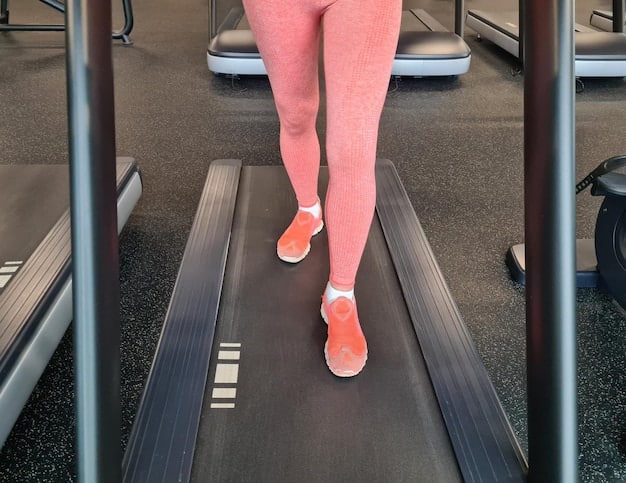Walk Your Way to Wellness: The Benefits of 30 Minutes a Day

Walking for just 30 minutes a day can significantly transform your health, offering numerous benefits from improved cardiovascular health and weight management to enhanced mood and increased energy levels.
Embarking on a journey to better health doesn’t always require intense gym sessions or complicated diets; sometimes, the simplest activities yield the most profound results. Discover the benefits of walking: how 30 minutes a day can transform your health, and how to incorporate this simple yet effective habit into your daily routine.
The Incredible Cardiovascular Benefits of Walking
Walking is a fantastic way to boost your cardiovascular health without putting excessive strain on your body. Regular walks can help strengthen your heart, improve circulation, and lower your risk of heart disease.
Incorporating a daily 30-minute walk can significantly improve your heart health over time.
Lowering Blood Pressure
Walking helps to lower blood pressure by improving blood vessel function and circulation. As you walk, your blood vessels become more flexible, allowing blood to flow more easily.
Reducing Cholesterol Levels
Regular walking can also reduce LDL (bad) cholesterol levels while increasing HDL (good) cholesterol. This helps to prevent the buildup of plaque in your arteries.
- Improved Heart Strength: Makes your heart more efficient.
- Better Circulation: Enhances blood flow throughout the body.
- Reduced Risk of Stroke: Lowers the likelihood of stroke by improving vascular health.
By consistently including walking in your daily routine, you can proactively care for your heart and reduce your risk of developing cardiovascular issues.

Walking for Effective Weight Management
Maintaining a healthy weight is crucial for overall well-being, and walking is an excellent tool to help you achieve this. Not only does it burn calories, but it also helps to build lean muscle mass, which further aids in weight management.
A consistent walking routine can contribute to a more balanced and healthy lifestyle.
Burning Calories
Walking burns calories, and the number of calories you burn depends on factors like your weight, pace, and the duration of your walk. Even a moderately paced walk can help contribute to a calorie deficit, which is essential for weight loss.
Boosting Metabolism
Besides burning calories during the activity itself, walking regularly can also boost your metabolism over time. This means your body becomes more efficient at burning calories, even when you’re at rest.
Consistent walking, combined with a balanced diet, is an effective approach to achieving and maintaining a healthy weight. Whether you aim to lose a few pounds or simply maintain your current weight, walking can be a valuable part of your strategy.

Elevating Your Mood with a Daily Walk
The benefits of walking extend beyond physical health; it can also have a profound impact on your mental and emotional well-being. Regular walks can help to reduce stress, alleviate symptoms of anxiety and depression, and improve your overall mood.
Walking is a natural mood booster that can easily be incorporated into your daily life.
Releasing Endorphins
Walking triggers the release of endorphins, which are natural mood elevators. These chemicals interact with receptors in your brain, reducing your perception of pain and triggering a positive feeling in the body.
Reducing Stress and Anxiety
A brisk walk can help clear your mind and reduce feelings of stress and anxiety. The rhythmic motion of walking can have a meditative effect, allowing you to detach from your worries and focus on the present moment.
- Improved Mental Clarity: Helps clear mental fog and improve focus.
- Reduced Risk of Depression: Regular walking can lower the risk of developing depressive symptoms.
- Enhanced Self-Esteem: Achieving fitness goals can boost self-confidence.
Including a daily walk in your routine can be a simple yet powerful way to enhance your mental and emotional well-being, leading to a happier and more balanced life.
Boosting Energy Levels Through Walking
It may seem counterintuitive, but walking can actually boost your energy levels. Engaging in regular physical activity, like walking, can reduce fatigue and increase overall vitality.
A short daily walk can provide a natural and sustainable energy boost.
Improving Circulation
Walking improves circulation, which means that more oxygen and nutrients are delivered to your cells. This can help you feel more alert and energized throughout the day.
Combating Fatigue
Regular physical activity combats fatigue by strengthening your cardiovascular system and improving your body’s efficiency. This reduces the amount of effort needed to perform daily tasks, conserving energy.
Instead of reaching for that afternoon coffee, consider taking a brisk walk to revitalize your body and mind. Walking can provide a more sustained and natural energy boost, helping you stay productive and focused.
Walking and Its Positive Impact on Bone Health
Maintaining strong and healthy bones is essential as we age, and walking is a great way to support bone health. As a weight-bearing exercise, walking helps to stimulate bone growth and prevent bone loss.
Regular walking can play a vital role in long-term bone health and overall physical well-being.
Increasing Bone Density
Walking helps to increase bone density, making your bones stronger and more resilient. This is particularly important for women, who are at a higher risk of developing osteoporosis.
Preventing Osteoporosis
Regular walking can help to prevent osteoporosis, a condition characterized by weakened bones that are prone to fractures. By strengthening your bones through walking, you can reduce your risk of falls and fractures.
- Stronger Bones: Reduces the risk of fractures.
- Improved Joint Health: Keeps joints lubricated and flexible.
- Enhanced Balance: Lowers the risk of falls as you age.
Including walking in your routine can be a proactive step toward maintaining strong and healthy bones, helping you stay active and independent for years to come.
Making Walking a Habit: Tips and Strategies
While knowing the benefits of walking is one thing, making it a regular habit is another. It’s important to find ways to integrate walking into your daily life in a sustainable and enjoyable manner.
Here are some helpful tips and strategies to transform walking from an occasional activity into a lifelong habit.
Start Small and Gradually Increase
Begin with shorter walks and gradually increase the duration and intensity as you become more comfortable. This prevents burnout and reduces the risk of injury.
Find a Walking Buddy
Walking with a friend or family member can make the experience more enjoyable and keep you motivated. Social support can make it easier to stick to your walking routine.
Incorporate Walking into Your Commute
If possible, walk part of the way to work or during your lunch break. This integrates walking into your daily routine without requiring extra time.
| Key Benefit | Brief Description |
|---|---|
| ❤️ Cardiovascular Health | Improves heart strength and lowers blood pressure. |
| 🔥 Weight Management | Burns calories and boosts metabolism for weight control. |
| 😊 Mood Elevation | Reduces stress, anxiety, and enhances overall mood. |
| ⚡️ Energy Boost | Improves circulation and reduces fatigue for sustained energy. |
Frequently Asked Questions About Walking
▼
A brisk pace, where you can talk but not sing, is ideal. Aim for a moderate intensity that slightly elevates your heart rate and breathing.
▼
While walking offers numerous benefits on its own, complementing it with other forms of exercise like strength training can provide a more comprehensive fitness routine.
▼
Wear comfortable clothing and supportive shoes appropriate for walking. Consider the weather and dress in layers to stay comfortable during your walk.
▼
Listen to music or podcasts, walk with a friend, explore new routes, or set small goals to keep your walks interesting and motivating over time.
▼
Walking is a low-impact exercise suitable for most people. However, it’s always best to consult with your healthcare provider before starting any new exercise routine, especially if you have underlying health conditions.
Conclusion
Incorporating a 30-minute walk into your daily routine is a simple yet powerful way to enhance your overall health. From improving cardiovascular health and managing your weight to elevating your mood and boosting your energy levels, the benefits of walking are extensive and accessible to everyone. Make walking a habit and experience the transformative effects it can have on your well-being.





